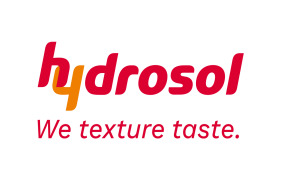Plant-based trend boosts demand for hydrocolloids
9 May 2020Alongside taste, texture is one of the most important attributes in new product development, and the growing market trend for plant-based foods and beverages has boosted demand for the texturizing properties of various hydrocolloids.
Used for thickening, stabilising, emulsifying, gelling and coating, hydrocolloids and gums are a diverse group of ingredients that can have a big impact on the structure of foods. For new plant-based products – particularly those that aim to emulate animal-derived foods like dairy or meat – product developers are turning to these versatile ingredients to transform unfamiliar ingredients into familiar textural experiences.
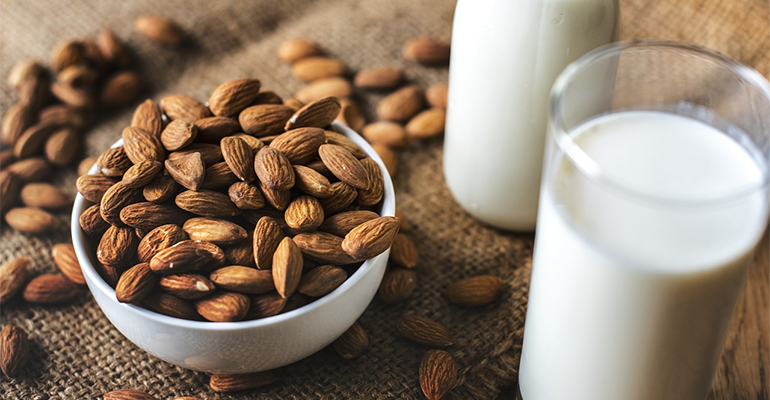
According to Innova Market Insights, the number of new foods and beverages containing hydrocolloids has risen an average of 7% a year from 2015 to 2019. Maltodextrin and corn starch lead the market, each appearing in about 15% of all products with hydrocolloids, followed by xanthan gum, guar gum and pectin. All these ingredients are of natural origin, which, along with their functionality, may help explain why they are favoured by manufacturers – although whether they qualify as ‘clean label’ is highly subjective. Meanwhile, use of gellan gum is growing faster than that of any other hydrocolloid, at about 30% a year.
Meat alternatives, yoghurt alternatives and alternative dairy drinks all offer big potential for hydrocolloids, and the textural properties of these products have improved enormously over the past few years. Until recently, soy-based beverages, for instance, tended to suffer from a somewhat chalky, grainy or watery consistency, but increased innovation with starches and hydrocolloids has raised the bar for the entire dairy-free industry.
The sales speak for themselves. According to Innova, the global market for dairy alternative drinks has more than doubled in value since 2010, while the number of new dairy alternative product launches grew by an average of 17% per year from 2013 to 2017. Ingredient suppliers including Hydrosol and Tate & Lyle have developed new ranges of starches and hydrocolloids specifically to help manufacturers of such products achieve better texture.
In addition, hydrocolloids often are working behind the scenes to increase the appeal of novel plant protein ingredients, or to make them viable alternatives in certain conditions, such as in hot climates. In meat alternatives, too, hydrocolloids are a standard feature. Impossible Burgers use methylcellulose and modified food starch, for instance, while Meat Free Days’ Vegan Vissticks use methylcellulose, corn starch and wheat starch.
As well as how they function in any particular product, manufacturers’ choice of texturizing ingredients ultimately is pressured by market trends. These include price and availability, but also those that are consumer-driven, such as demand for clean label and vegetarian ingredients, as can be seen with rising use of pectin in place of gelatine, for example. With this in mind, more natural, sustainably sourced and easily recognisable hydrocolloids could feature on plant-based ingredient lists as the category develops.
Related news

Plastic packaging reduction requires industry rethink
6 Jan 2023
The food and beverage sector is calling for industry-wide collaboration and business model updates to reduce the environmental impact of plastic packaging.
Read more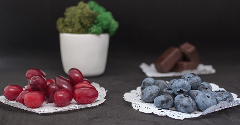
Misleading nutrition claims mask true sugar levels in baby food
5 Jan 2023
Some baby and toddler food and drink products, sweetened with fruit concentrate, contain up to four teaspoons of sugar per serving yet are marketed as having ‘no added sugar’, according to a survey by Action on Sugar.
Read more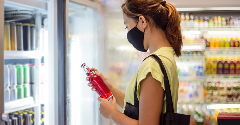
Asian beverage brands deal with rising costs
4 Jan 2023
Decreasing bottle sizes or increasing prices? Asian beverage brands are finding “creative approaches” to manage rising costs, according to industry analysts.
Read more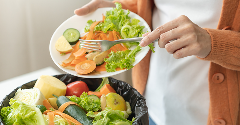
Preserving the freshness of food to fight waste
3 Jan 2023
Several companies are producing products that absorb ethylene, the hormone that causes food to ripen, in attempt to reduce food waste.
Read more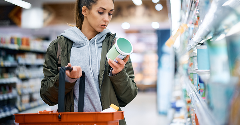
Value-seeking US consumers cut back on food spending
2 Jan 2023
Cheaper items, smaller sizes, and shorter grocery lists: inflationary effects coupled with a global long-term recession are set to continue shaping food spending habits, according to a recent Rabobank report.
Read more
Opportunities grow for lower-caffeine coffee
23 Dec 2022
Many consumers want the mental focus of caffeine without the jitters, prompting a wave of product development such as “half caffeine” ground coffee or ready-to-drink (RTD) cold brew blended with relaxing botanicals.
Read more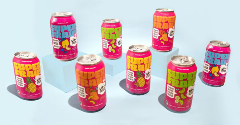
Superfrau upcycles liquid whey for energy drinks
22 Dec 2022
US company Superfrau turns surplus whey into sustainable, upcycled-certified dairy products for the recovery drinks market.
Read more
Malaysian brand Nanka brings jackfruit range to Europe
21 Dec 2022
Malaysian brand Nanka is expanding to new Asian and European markets with its fast and ready-to-eat plant-based products based on jackfruit.
Read more
Is the UK on target to meet its 2025 Plastics Pact?
20 Dec 2022
Major food industry players, including Arla, Kerry, PepsiCo and TerraCycle, have signed the UK’s voluntary Plastic Pact to reduce plastic from the supply chain – but are they on track to meet their targets?
Read more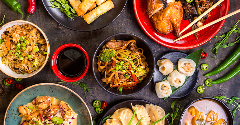
Chinese food brand wants to give customers ‘the full experience’
16 Dec 2022
Food brand Xiao Chi Jie is revamping Chinese cuisine for the modern American consumer. The Washington-based company sells regional Chinese specialties like soup dumplings, noodle kits, and barbeque skewers direct-to-consumer in the US.
Read more